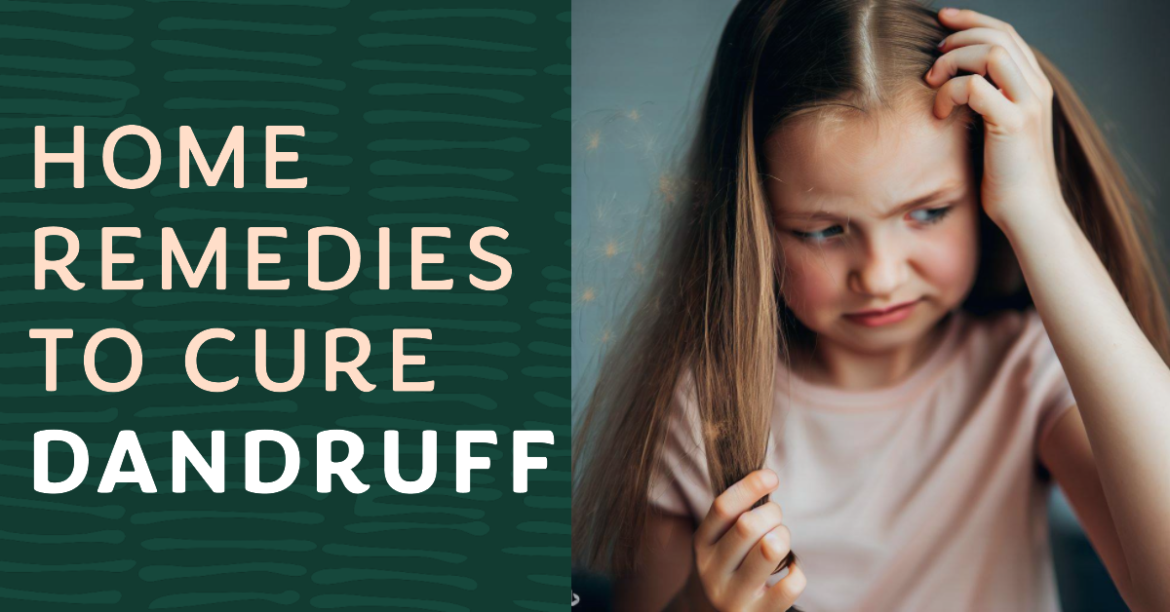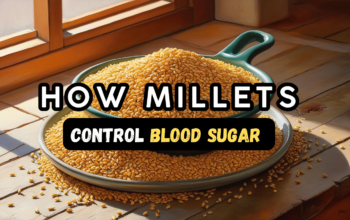Are you tired of those pesky white flakes invading your hair and shoulders? Dandruff can be a real confidence killer, but fear not – there’s a treasure trove of natural remedies right in your kitchen that can help banish dandruff and bring back the luster to your hair. In this article, we’re diving into the causes of dandruff, exploring effective home remedies, and even suggesting some foods to include in your diet to keep those flakes at bay. So, let’s bid adieu to dandruff and say hello to a healthier scalp!
Unveiling the Culprit: Causes of Dandruff
Before we embark on our journey to conquer dandruff, it’s essential to understand the factors that can trigger this scalp annoyance. Dandruff isn’t just a result of poor hygiene; it’s a complex interplay of various elements. Here’s a closer look at the causes of dandruff:
- Oily Scalp: An overly oily scalp can create an environment conducive to the growth of a yeast-like fungus called Malassezia. This fungus feeds on the excess oil and produces irritants that can lead to flakiness and itching.
- Dry Scalp: On the flip side, a dry scalp can also be a culprit. When the skin on your scalp is dry, it can lead to itchiness and flaking. These flakes can be mistaken for dandruff but require a different approach for treatment.
- Malassezia Fungus: As mentioned earlier, the Malassezia fungus is naturally present on the scalp. However, an overgrowth of this fungus can cause irritation, leading to dandruff. It’s the same fungus responsible for conditions like seborrheic dermatitis and fungal acne.
- Sensitive Skin: Some individuals have more sensitive skin, which can react to hair products, detergents, or environmental factors. This sensitivity can trigger itching, flaking, and the appearance of dandruff-like symptoms.
- Inadequate Hygiene: While dandruff isn’t solely caused by poor hygiene, infrequent hair washing or improper cleansing can contribute to the accumulation of oil, dead skin cells, and dirt, creating an environment for dandruff to thrive.
- Stress: Yes, stress isn’t just a mental burden – it can also impact your scalp health. Stress can disrupt the natural balance of your body, affecting hormone levels and potentially leading to dandruff.
- Diet and Nutrition: Your diet plays a role too. Consuming excessive sugary or greasy foods may contribute to dandruff by altering the balance of your scalp’s natural oils.
- Skin Conditions: Certain skin conditions like psoriasis and eczema can lead to flaking and itching that might be mistaken for dandruff. These conditions require specialized treatment.
Home Remedies to Cure Dandruff
Understanding these underlying causes can help you choose the right approach to treating dandruff effectively. Keep in mind that everyone’s scalp is unique, so what works for one person might not work for another. Experimenting with different remedies and consulting a dermatologist if the problem persists is always a smart move.
1. Tea Tree Oil Magic:
Tea tree oil is a superhero in the world of natural remedies. It has potent antifungal and antibacterial properties that make it a stellar choice for tackling dandruff. Mix a few drops of tea tree oil with your regular shampoo and use it while washing your hair. Alternatively, dilute tea tree oil with a carrier oil (like coconut oil) and massage it onto your scalp. Let it sit for 30 minutes before washing it out. This remedy not only fights dandruff but also leaves your scalp feeling refreshed.
2. The Marvelous Aloe Vera:
Aloe vera is more than just a sunburn soother – it’s also a fantastic dandruff remedy. Scoop out the gel from an aloe vera leaf and apply it directly to your scalp. Leave it on for about 20 minutes before washing your hair. Aloe vera’s soothing properties can help reduce inflammation, itching, and flakiness.
3. Curd Power:
Your kitchen’s secret weapon against dandruff might just be curd (or yogurt). The probiotics present in curd help maintain a balanced scalp flora, reducing the growth of dandruff-causing fungi. Apply plain, unflavored curd to your scalp and leave it on for 30 minutes. Wash it off with a gentle shampoo. Repeat this remedy a few times a week to see results.
4. Lemon Elixir:
Lemons aren’t just for lemonade; they can also be a game-changer in your fight against dandruff. The acidity of lemon juice helps balance the pH of your scalp and control excess oil production. Mix the juice of one lemon with equal parts water and apply it to your scalp. Leave it on for 5-10 minutes before washing it off. Remember, lemon juice can be drying, so follow up with a good conditioner.
5. Baking Soda Wonder:
Baking soda is another kitchen staple that can work wonders for dandruff. Its exfoliating properties help remove dead skin cells and flakes. Wet your hair and rub a handful of baking soda onto your scalp. After a couple of minutes, rinse your hair thoroughly. However, don’t overdo this remedy, as frequent use might lead to dryness.
6. Magical Fenugreek Seeds:
Fenugreek seeds might not be the most common item in your pantry, but they are definitely worth considering. Soak a handful of fenugreek seeds overnight and grind them into a paste the next morning. Apply this paste to your scalp and leave it on for 30-60 minutes before washing your hair. Fenugreek’s antifungal and soothing properties can help combat dandruff effectively.
7. Coconut Oil Champ:
Coconut oil is a champion when it comes to moisturizing your scalp and reducing dandruff. Warm up some coconut oil and massage it onto your scalp using circular motions. Leave it on overnight and wash your hair in the morning. This remedy not only nourishes your scalp but also adds a luxurious shine to your hair.
8. Apple Cider Vinegar Magic:
Apple cider vinegar is a jack-of-all-trades when it comes to natural remedies, and dandruff is no exception. Mix equal parts of apple cider vinegar and water and use it as a final rinse after shampooing. Its acidity helps restore the pH balance of your scalp and keeps dandruff at bay. Just be cautious not to apply it directly to your scalp, as it can be strong.
Dandruff-Fighting Foods
While external remedies are essential, don’t underestimate the impact of your diet on your scalp’s health. Including certain foods in your diet can help prevent and control dandruff:
- Omega-3 Fatty Acids: Incorporate foods rich in omega-3 fatty acids, such as fatty fish (salmon, mackerel), flaxseeds, and walnuts. These healthy fats help reduce inflammation on the scalp, which can contribute to dandruff.
- Probiotic-Rich Foods: Yogurt, kefir, sauerkraut, and other probiotic-rich foods can help maintain a healthy scalp flora, minimizing the growth of dandruff-causing fungi.
- Zinc-Rich Foods: Foods like nuts, seeds, whole grains, and legumes are high in zinc, which plays a crucial role in regulating oil production on the scalp.
- Vitamin B-Complex: Consume foods rich in B vitamins, such as leafy greens, eggs, and whole grains. These vitamins promote a healthy scalp and prevent excessive oiliness.
Frequently Asked Questions (FAQs) about Dandruff Treatment and Diet
When should I see a doctor for dandruff treatment?
If home remedies don’t show improvement within a few weeks or if dandruff is severe, accompanied by redness or inflammation, consult a dermatologist for proper guidance.
Can dandruff lead to hair loss?
While mild dandruff usually doesn’t cause hair loss, severe cases or conditions like seborrheic dermatitis might contribute. Treating dandruff promptly can help maintain scalp health and reduce the risk.
How often should I use home remedies for dandruff?
It’s recommended to use home remedies 2-3 times a week initially. Once improvement is seen, you can reduce frequency to maintain a healthy scalp.
Are there any side effects of using natural remedies for dandruff?
Natural remedies are generally safe, but some people might experience irritation or allergy. Always do a patch test and discontinue if any adverse reactions occur.
Can stress worsen dandruff?
Yes, stress can trigger or exacerbate dandruff. Stress impacts your body’s immune response and hormonal balance, which can affect your scalp health.
How long does it take to see results from dandruff remedies?
Results vary depending on the remedy and your scalp’s condition. Some people see improvement within a few weeks, while others might take longer.
Can my diet really affect dandruff?
Yes, certain foods can influence dandruff. A diet rich in omega-3 fatty acids, zinc, and B vitamins supports scalp health and helps reduce dandruff symptoms.
Can dandruff be completely cured with dietary changes alone?
While diet plays a role, dandruff treatment is often multifaceted. Combining dietary adjustments with proper hair care and targeted remedies can yield better results.
How can I maintain a dandruff-free scalp after treatment?
After treating dandruff, continue using mild shampoos and incorporating scalp-friendly foods. Regular hair washing, avoiding excessive heat, and managing stress can help prevent recurrence.
Can Castor Oil Be Used as a Remedy for Dandruff?
Yes, castor oil can help with dandruff. Its antimicrobial and moisturizing properties nourish the scalp, reducing flakes. Mix with a carrier oil, apply, and leave for a few hours before washing.
In Conclusion:
Dandruff might be persistent, but armed with these natural remedies and dietary tips, you’re well on your way to achieving a healthier, flake-free scalp. Remember, consistency is key, and it might take some time to notice significant improvements. Embrace these remedies as part of your routine, and bid farewell to those unwanted white flakes. Your hair deserves to shine without any interruptions, so let nature’s pantry be your go-to solution for dandruff blues.



